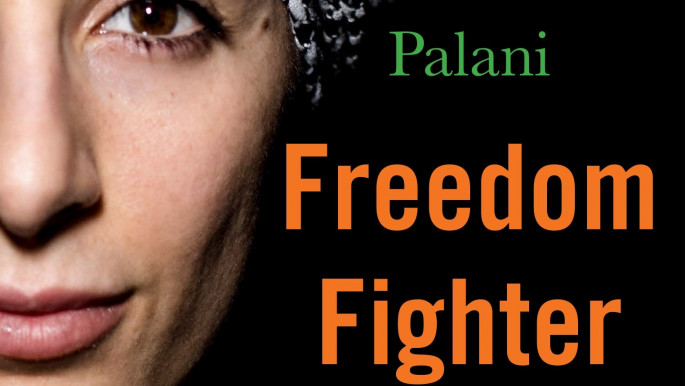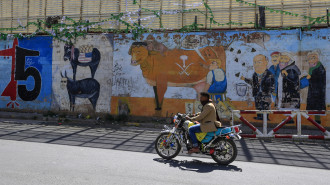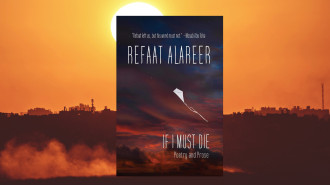From sniper to writer: How one woman took on the Islamic State group
Originally of Kurdish origin from the Iranian province of Kermanshah, Joanna was born in the Ramadi desert in Iraq, close to the Jordanian border.
"My family was against the 'Islamic war' started by (the former Supreme Leader of Iran) Khomeini on the Sunni Kurds who paid a heavy price with blood," she told The New Arab. "Both my father and grandfather were Peshmerga fighters... By the end, we had to leave Kermanshah to Ramadi."
In 1996, at the age of three, she moved to Denmark as part of a UN refugee quota programme.
"Before I came to Denmark, I remember I made a promise to myself to make a difference. This was my plan as a three-year-old, when I was just a girl digging holes in the desert for water."
As she got older, she wanted to defy the patriarchal society which she believes rules everywhere in the Middle East, citing a sexual revolution carried out by an all-female militia with a common ideology globally.
"I have been a militant saboteur since I was a teenager, but I became a sniper during my last battle in Syria. I was trained by multiple groups in Kurdistan and outside the Kurdish territory."
 |
|
Despite her aspirations, was Joanna aware of the consequences of joining the fight against the Islamic State group?
"Back then my thoughts regarding the consequences mostly contained the possibility of me being captured by IS. Never would I ever believe that the outcome, which had an impact on my life, would emerge from my own loved ones."
In fact, she confidently says that IS would have never been able to hurt her in the profound manner that her own community has.
After coming back to Denmark from Syria, she felt a sense of abandonment. She was lonely, had no money, no ID, no shelter and faced rejection from her social circle. Even though returned fighters were receiving help from the Danish authorities, in her case she felt it was chaos.
"I never had anyone showing up to my court trials. The same land which I was risking my life for was now willing to take my freedom away for no reason. I was nearly arrested at the bank after trying to take money out of my own account for food. As of now, I do not have a bank card nor a student card – technically I have nothing," she explains.
"With all due respect to the Western world, I do not look Danish so it is extra hard for me to be a civilian here with no equal possibility to live here as one either."
Hundreds of young fighters travelling to join extremist groups in the Middle East, notably in Syria, emerged from Denmark, but rather than focusing on punishment, surveillance and deterrence for those returning, the country chose to concentrate more on reintegration.
Denmark introduced the so-called Aarhus model with aims to create trust between the authorities and the social circles in which radicals operate. The model focused on inclusion and working with the community to bring the young people who may have become disenchanted and at risk from radicalisation back into the fold.
Under the programme, individuals such as returning fighters or "radicals" who want to fight abroad are assigned trained mentors and can also receive psychological counselling.
But Joanna says she was not offered any options after her return.
"Others have been taken care of, whereas I am being punished. I did not only fight for my own faith or nation, but also for the outside world which was jeopardised by the Islamic State group.
"I cannot deny the decision was completely made by myself... I need to hold to that and keep my head high," Joanna added. She also stressed the role of the authorities in taking care of their youth.
"Governments must ensure that there are progressive results with their anti-radicalisation programmes."
Joanna explained that she does not see herself posing any threat to Denmark and holds no prior criminal record either, but nevertheless she was sentenced to nine months in jail and banned from leaving Denmark with her passport taken away.
Now she says she would only like to focus on rebuilding herself after experiencing a "great deal of betrayal".
With regards to her memoir, she says: "It's one story with one woman and one voice." But trying to put pen to paper to write her story came during a difficult time. She felt isolated, lacked sleep and suffered from depression all due to the hardship and backlash she faced as a returning fighter.
However, she persisted. "If my story brings attention to the sexual revolution in the Middle East, I would be glad. I hope other girls will come forward to raise their stories," she says.
Joanna Palani's story is a thought-provoking one which makes you wonder the price one has to pay to fight for freedom against extremism. It would not be wrong to say that she has paid a hefty price for standing up for what she thought was right. As the famous phrase goes: "One man's terrorist is another man's freedom fighter."
Order your copy of Freedom Fighter: My War Against ISIS on the Frontlines of Syria here.
Rabi’ah M is a London-based journalist covering arts, culture, entertainment, lifestyle, and fashion.
Follow her on Instagram: @bohemian_danoosh








 Follow the Middle East's top stories in English at The New Arab on Google News
Follow the Middle East's top stories in English at The New Arab on Google News


